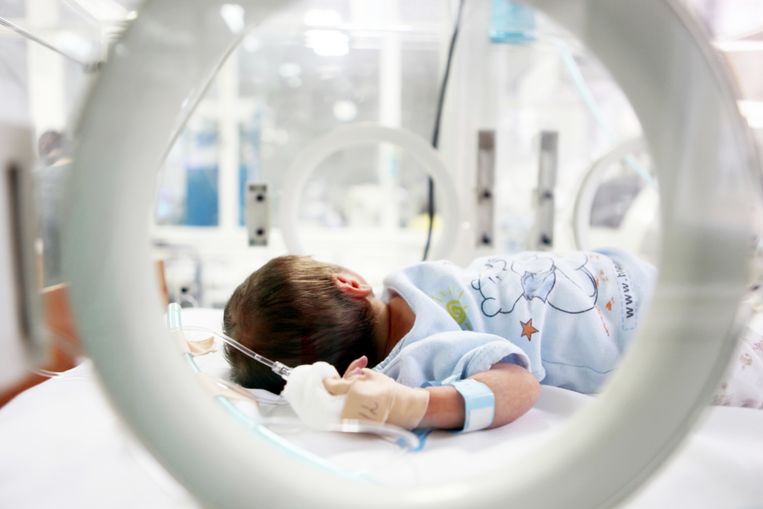Smoking during pregnancy is even more harmful than thought. The risk of premature birth is even twice as high as assumed in previous studies.
Elleke Bal30 September 2023, 10:26
Anyone who smokes during pregnancy would rather not make it public. So much is known about the adverse consequences for mother and child that a pointing finger from others is never far away. Yet many studies of smoking during pregnancy rely on self-reporting, which means that socially desirable answers may play a role in the outcomes.
To prevent this, a group of researchers from the British University of Cambridge took a different approach. Between 2008 and 2012, they followed a group of more than 900 pregnant women at the Rosie Hospital, a maternity hospital in the university city of Cambridge. Blood was taken four times from them at a gestational age of 12, 20, 28 and 36 weeks. The blood was then examined for the metabolites, metabolic products, of tobacco smoke, and also coffee: cotinine (an important breakdown product of nicotine) and paraxanthin (of caffeine).
Beeld Colourbox
On average 387 grams lighter
Their analysis after the birth of all babies shows that smoking during pregnancy is more harmful than thought. Women with traces of nicotine in their blood had an almost three times higher risk of spontaneous preterm birth than non-smokers. Double as much as in previous estimates. The babies of smokers were also on average 387 grams lighter than babies of non-smokers. The results have been published in the International Journal of Epidemiology.
It is known that premature birth and low birth weight are associated with a higher risk of developmental delay and health problems later in life. For example, children of mothers who smoke are more likely to be born with reduced lung function, and later they are more likely to develop learning problems, obesity and various types of cancer.
Of the more than 900 women followed in the British study, 78 percent did not smoke. Light, non-continuous exposure to nicotine was found in almost 12 percent of pregnant women, and almost 10 percent (89 women) had continuous traces of nicotine in the blood. Of the latter group, two-thirds of women said they smoked. A third reported not, which is an indication of the studies to date that have relied on self-reporting.
Second-hand smoke is also harmful
According to the Trimbos Institute, 7.7 percent of Dutch pregnant women smoke at some point during pregnancy. Jasper Been, pediatrician-neonatologist at Erasmus MC, is a researcher working on quitting smoking during pregnancy. He calls it an important study that is well put together, especially due to the objective measurements of traces of tobacco smoke in the blood.
The study confirms what many people already know, that smoking during pregnancy has serious consequences, says Been. “And these consequences appear to be even more serious than we previously thought.” According to him, a weaker point of the study is that it cannot be clearly determined from the levels of cotinine in the blood whether the women really smoked themselves, or whether, for example, they inhaled their partner’s tobacco smoke through ‘second-hand smoke’. Although this makes little difference to the results, passive smoking also has serious consequences.
He also mentions the total number of spontaneous premature births in the study in the group of women who smoke, namely 14 out of 89, as too low to draw broad conclusions from. But he does not want to detract from the results. According to him, the big follow-up question is: “What do we do about it?”
No judgement, but help
Been is afraid that over the years smoking has been made too much of an individual matter of choices. “This is a social problem. Smoking has become so normalized.” Nowadays, many people are aware of the serious consequences for the unborn child. According to him, a mistake that is often made is that people look judgmentally at pregnant women who smoke. “While this is a serious addiction that women need help with.” According to him, the ‘smoke-free parents’ program of the Trimbos Institute is a good example of help.
The British researchers also looked at the effects of caffeine. The results there turned out to be much less clear. Pregnant women are recommended not to consume more than 200 mg of caffeine per day, approximately two cups of coffee or tea per day. But in this study, a higher average caffeine intake was not found to be associated with premature birth or smaller babies. Coffee lovers have just as much chance of this as women who do not drink coffee or who adhere to the recommended value. Additional research will therefore be needed, the researchers say.
This study was published in the International Journal of Epidemiology and is here to read again.
Also read:
Researchers: Tobacco taxes reduce infant mortality
If every country had raised tobacco taxes to more than 75 percent of the retail price, as the World Health Organization (WHO) recommended, approximately 231,000 fewer children under the age of 1 would have died in 2018.
Science
2023-09-30 09:58:51
#special #study #shows #smoking #pregnancy #harmful #previously #thought


